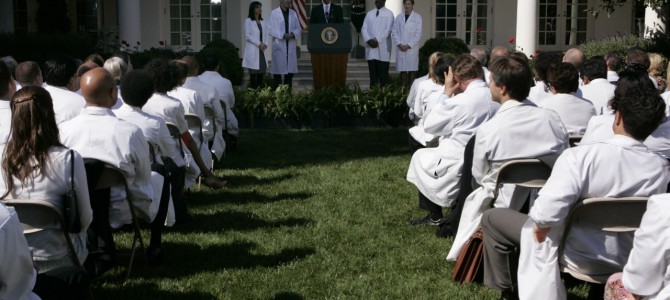
A few days ago Scott Gottleib and Zeke Emmanuel co-authored an op-ed in the New York Times pooh-poohing the concern about physician shortages.
So certain are they that conventional wisdom is wrong that the piece is headlined, “No, There Won’t be a Doctor Shortage.” Right, and “If you like your health plan, you can keep your health plan – period.” Somehow such bold assertions have lost a bit of their luster over the past few months.
Now, they acknowledge that an aging population and the prospect of 30 million newly insured people may make it seem like there might be a problem, and the Association of American Medical Colleges says their members aren’t able to train enough physicians to fill the need, but what do they know about physician supply? Gottleib and Emmanuel know better.
As Exhibit One, they look at Massachusetts. They write:
Take Massachusetts, where Obamacare-style reforms were implemented beginning in 2006, adding nearly 400,000 people to the insurance rolls. Appointment wait times for family physicians, internists, pediatricians, obstetricians and gynecologists, and even specialists like cardiologists, have bounced around since but have not appreciably increased overall, according to a Massachusetts Medical Society survey.
That is a wild mischaracterization of the Medical Society’s research. The press release about the 2013 survey quotes Dr. Ronald Dunlop, president of the group, as saying:
Our latest survey once again points out a critical characteristic of health care in the Commonwealth. While we’ve achieved success in securing insurance coverage for nearly all of our residents, coverage doesn’t guarantee access to care. The concern is that limited and delayed access can lead to undesirable results, as people will seek more costly care at emergency rooms, delay care too long, or not seek care at all.
He doesn’t sound as complacent as Gottleib and Emmanuel. The release goes on to say:
The 2013 study shows wait times for new patient appointments with primary care physicians remain long in the Commonwealth, with the average time to see a family medicine physician at 39 days (down from 45 days in 2012) and the average wait time to see an internal medicine physician at 50 days (up from 44 days in 2012).
Of course looking at Massachusetts in a vacuum doesn’t tell us much. In 2009, Merritt-Hawkins conducted a study comparing the waiting times to see a specialist in Boston after its health law and compared the results to other major cities in the United States. It found:
| City | Average Wait in Days |
| Boston, MA | 49.6 |
| Philadelphia, PA | 27.0 |
| Los Angeles, CA | 24.2 |
| Houston, TX | 23.4 |
| Minneapolis, MN | 19.8 |
| New York, NY | 19.2 |
| Denver, CO | 15.4 |
| Minneapolis, MN | 15.4 |
| Miami, FL | 14.2 |
So people have to wait two to three times as long to see a specialist in Boston than in other urban centers.
This is even more astonishing when we consider that Massachusetts has far and away the greatest number of practicing physicians as any other state, and it had one of the lowest rates of non-insurance of any state when its law was enacted. Fewer newly insured people and far more doctors to absorb them. No place in the country was better able to absorb increased demand, but still the waiting times are astronomical.
Consider: When Massachusetts passed its health reforms, it had an uninsured rate of 9.4% and it had 4.53 physicians per 1,000 people. Compare this to the conditions in the states cited above:
| State | Percent uninsured | Number of Physicians per 1,000 |
| PA | 13% | 3.26 |
| CA | 21% | 2.52 |
| TX | 27% | 2.11 |
| MIN | 10% | 2.90 |
| NY | 13% | 3.57 |
| CO | 17% | 2.53 |
| FL | 25% | 2.46 |
SOURCE: Kaiser Family Foundation State Data
Many of these states have half the number of physicians and two to three times the number of uninsured — and the experience in Massachusetts is supposed to comfort us about physician capacity? These states would more likely have waiting times double those in the Bay State.
Not to worry, say Gottleib and Emmanuel. We will get the Docs to be more productive and supplement them with nurse practitioners – problem solved! Except we are also facing a shortage of nurses, according to the American Association of Colleges of Nursing, especially advanced practice nurses. More importantly, we also have a shortage of professors in nursing schools to train new nurse practitioners. So the likelihood of replacing many physicians with nurse practitioners is exceedingly small.
Now, of course, this all assumes a world of Make Believe in which the Obamacare web site works well, nobody loses their coverage, and the uninsured sign up for wonderful new health plans with both affordable premiums and low out-of-pocket costs. That is the only way we will actually get 30 million newly insured people demanding physician services. I’m not holding my breath.









